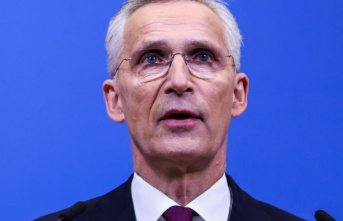The German Hospital Society (DKG) has asked the federal and state governments to submit a "coordinated process and timetable" for implementation before deliberations on the planned major hospital reform. "The hospitals need planning security and future prospects as quickly as possible in order to be able to prepare the locations for the new supply tasks and supply realities," said DKG CEO Gerald Gass on Wednesday. We have been in a kind of permanent crisis mode for many years.
Federal Health Minister Karl Lauterbach (SPD), the health ministers of the federal states and experts from the coalition factions will discuss the topic in a switching conference this Thursday.
In its coalition agreement, the traffic light had set itself the task of initiating "the necessary reforms for modern and needs-based hospital care". To this end, a commission of experts was set up last May, which has since submitted three statements with concrete proposals for reform. It was about more money for children's and maternity clinics, about relieving the burden on staff through fewer unnecessary overnight stays in clinics and finally about financing the hospitals.
Largest chunk of clinic financing
The proposals for children's clinics, obstetrics and fewer overnight stays in clinics have already been enacted by law, now it's a matter of implementing the biggest chunk: the reform of clinic financing. In Germany there are around 1,900 hospitals with around 488,000 beds. About a third of the annual expenditure on benefits by the statutory health insurance companies - more than 85 billion euros - go to hospital treatment.
The financial reform aims to distribute resources better. The chairman of the commission and longtime chief physician of a Berlin clinic, Tom Bschor, had spoken of "oversupply" in certain areas and "undersupply" in paediatrics, for example. In an interview with "apotheken-umschau.de" he explained that Germany spends more money on its hospitals than its European neighbors. "Nevertheless, clinics or departments are struggling to survive financially and there are still major quality deficits: strokes, for example, are not only treated in departments with a special stroke unit and cancer is too often not treated in certified cancer centers."
The federal and state governments are now discussing the concrete implementation of the following proposals from the Commission:
- Less "general store", more specialization. Clinics should receive specific orders as to which different services they should carry out (service groups) - for example kidney, heart or gastrointestinal treatments - instead of maintaining a general specialist department for internal medicine, in which "there may also be a small, poorly equipped department can do everything from an acute heart attack to complex cancer," says Bschor.
- According to the proposals, the hospitals should also be assigned to three levels nationwide and funded accordingly: clinics for basic care, houses with "regular and priority care" and "maximum care" such as university hospitals.
- The so-called flat rates per case should be significantly reduced. Clinics currently receive a flat-rate amount in euros per patient or treatment case. According to Lauterbach, this leads to a "hamster wheel effect" of carrying out as many treatments as cheaply as possible, which can affect quality and put additional pressure on the scarce staff. According to Bschor, falling flat rates would reduce the incentive to “install knee prostheses even if the indication is questionable” and free up money for so-called advance services.
- According to the reform proposals, hospitals should in future receive fixed amounts for the provision of staff, an emergency room or necessary medical technology ("provisional services"). "Like the fire brigade, which is not only paid when there is a fire," said the head of the expert commission.
The project is a long-term project. Lauterbach had spoken of a "revolution" for the clinics. "Medicine is once again placed in the foreground of therapy and does not follow economics," said the minister last month. Bschor believes it is "not illusory" that the reform could be implemented in legislation this year and come into force in early 2024. The commission then recommends a five-year transitional phase "in which the system is converted bit by bit".












